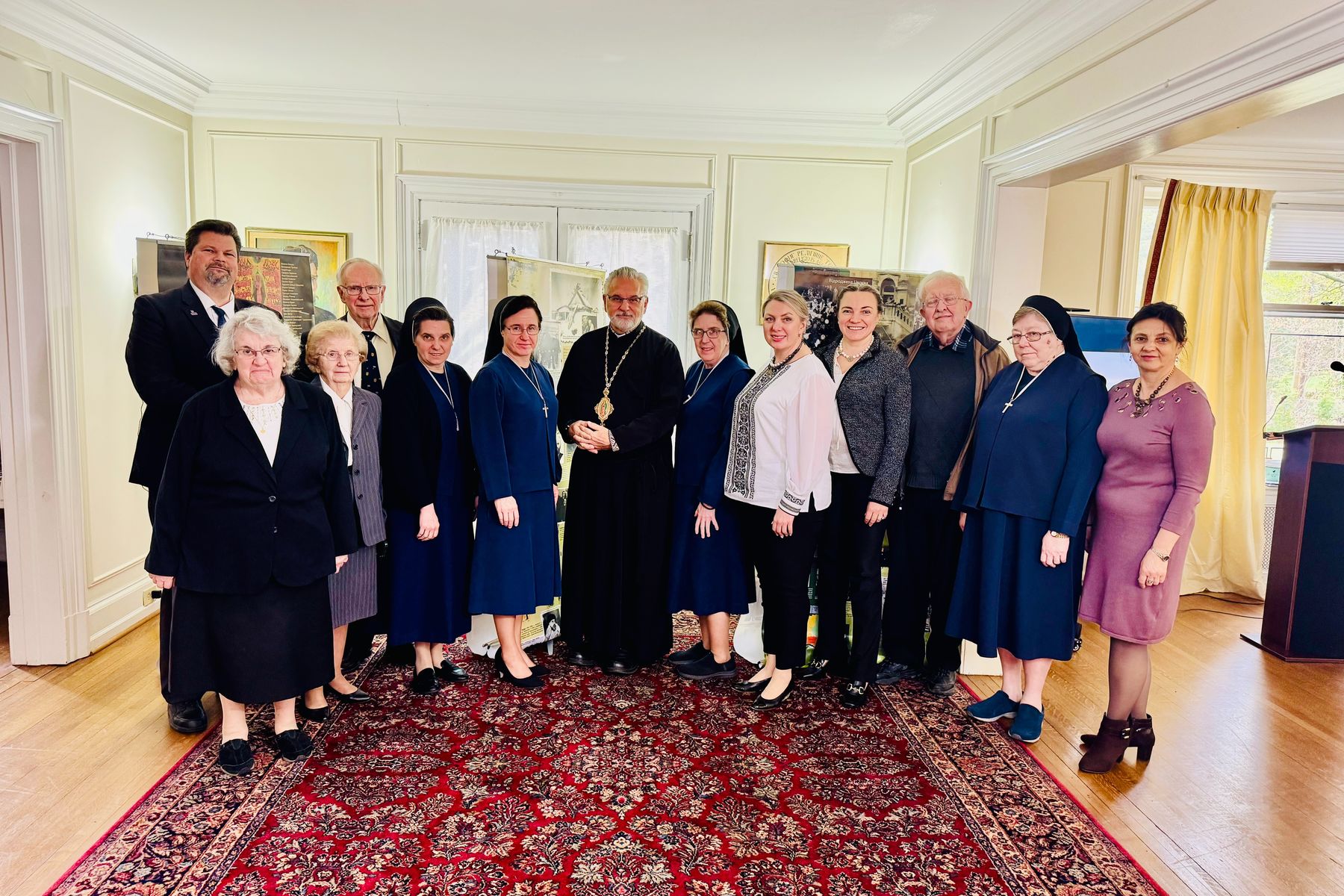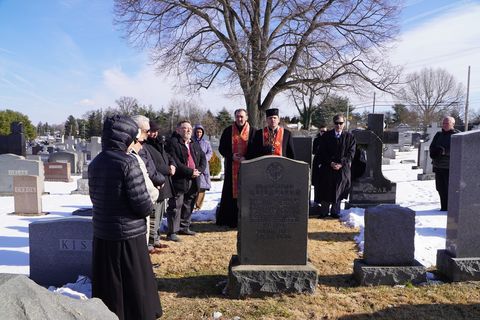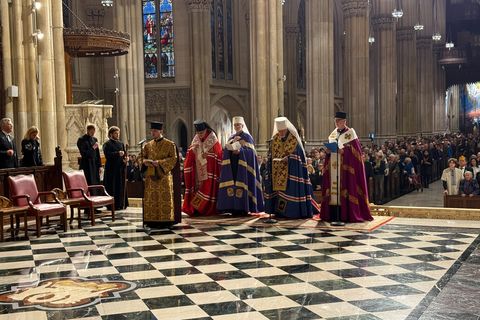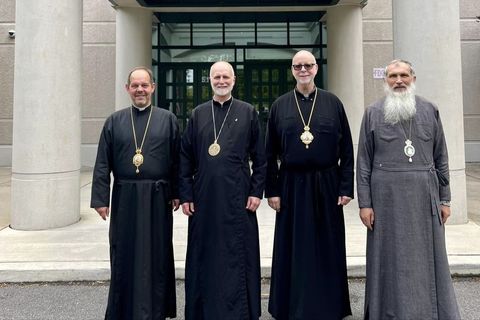“The Voice of the Persecuted”: Symposium Commemorating the 80th Anniversary of the Arrest and Imprisonment of Patriarch Josyf Slipyj and the UGCC Bishops
On April 12, 2025, St. Sophia Religious Association of Ukrainian Catholics, USA (SSRA), organized a symposium in Philadelphia commemorating the 80th anniversary of the arrest and imprisonment of Patriarch Josyf Slipyj and the bishops of the Ukrainian Greek-Catholic Church (UGCC). Nicholas Rudnytzky, Dean of Academic Services, Manor College, chaired the event. Five United States and Canada speakers delivered papers on topics reflecting the symposium’s theme.

Dr Andrew Sorokowski, President — Emeritus of the Ukrainian Patriarchal Society, discussed how the Soviet state used law to repress the clergy and laity of the Greek-Catholic Church in Soviet Ukraine between the Church’s suppression in 1945–46 and its legalization in 1989–91. The suppression of the Greek-Catholic Church and the persecution of its believers over the next forty years was a violation of the most fundamental human right: freedom of conscience and religion. In the absence of a law specifically banning the UGCC, Soviet prosecutors had to exercise some creativity in finding laws by which to harass and intimidate members of the Church, persuade them to join the Russian Orthodox Church, or at least dissuade them from overt religious activity. In the immediate post-war years, an accusation of treason, which carried the highest penalties, could be leveled at virtually anyone who had survived the German occupation. The Greek-Catholic Church’s organizational structures were damaged, but the succession of bishops survived. Some clergy continued to serve, both clandestinely and in the prisons and labor camps. Monastic communities remained under the guise of ordinary communal living arrangements. Here and there, the faithful gathered in private dwellings or out of doors.
However, by the mid-1980s, a crisis had arisen in the UGCC, connected with an aging clergy, the deaths of bishops, and the departure of some of the faithful who had begun attending Russian Orthodox Churches and were becoming accustomed to them. The number of priests had been reduced by 90 percent. According to the speaker, totalitarian repression had been effective. Some of the UGCC’s clergy and faithful persisted right up to the government’s liberalization beginning in 1985, the Church’s partial emergence from the underground in 1987, and its legalization in 1989–91. After Ukraine’s independence at the end of 1991, there was a surge in ostensible religiosity.
Dr Sorokowski drew attention to the persecution the UGCC has again been suffering since 2014, this time in Russian-occupied territories in eastern and southern Ukraine. Methods similar to those of the Soviet regime, including the abuse of law, are being applied, even though the laws are different. He is convinced that the example of the catacomb church will help contemporary Ukrainian Greek-Catholics endure.
Dr Iryna Ivankovych, President of St. Sophia Religious Association, presented the chronology and geography of Metropolitan Josyf Slipyj’s imprisonment. Arrested on April 11, 1945, along with all the UGCC hierarchs, he spent eighteen years in Soviet prisons and concentration camps. As emphasized by the speaker, the information about those years of forced labor, suffering, torture, and persecution was sparse for decades. Some recent publications, such as Prof. Volodymyr Serhiychuk’s “Патріарх Йосиф Сліпий у документах радянських органів державної безпеки” (Patriarch Josyf Slipyj in the Documents of the Soviet State Security, 2012) and Patriarch’s “Спомини” (Memoirs, 2014), have shed some light on the archival documents from this period of Metropolitan’s life. By tracking press reports from 1968–1970 about the pastoral journeys of Metropolitan Slipyj to Ukrainian communities in exile, compiled by Olha Vitoshynska in “Подорожі Блаженнішого Йосифа VII, 1968–1970” (The Journeys of His Beatitude Josyf VII, 1968–1970), and selecting fragment for Metropolitan’s Memoirs, the speaker recorded a detailed chronology and geography of his imprisonment. She emphasized the reluctance with which Patriarch publicly spoke about his thorny path, indomitable spirit, and unwavering faith in the face of red terror. The full version of the chronology can be found in Dr. Ivankovych’s new book “Патріярх Йосиф Сліпий. Грані й орієнтири” (Patriarch Josyf Slipyj. Facets and Beacons).
Bishop Bryan Bayda, eparch of Toronto and Eastern Canada, spoke about the pain and suffering of the Redemptorist Martyrs, how the Mother of God accompanies them and teaches them the meaning of suffering and how to witness it. She witnessed to the love of the Father when She accompanied Jesus in His Holy Passion. Martyrs do this with all that they have been given in life, indeed, to the point of death. Blessed Bishop Nicholas Charnetsky, CSsR was beaten to death and froze. Blessed Father Ivan Ziatyk, CSsR died for the faith. Blessed Father Zynoviy Kovalyk was nailed to a prison wall in mockery of the crucifixion of Jesus. These are examples of people who drew strength from the Mother of God in witnessing to the love of the Father. Blessed Bishop Vasyl Velychkowsky, CSsR was “tortured in a psychiatric hospital with electrical wire and chemicals. He was given drugs to cause heart disease and to ruin his nervous system. As the time of his release neared in 1972, he was again given drugs that worked slowly to cause his death. ‘The Theotokos, Our Mother of Perpetual Help is our HOPE, our protection, our refuge, our comfort and our joy! The martyrs knew Her in this way,’ emphasized Bishop Bryan.
Sr. Eliana Ilnytsky, Provincial Superior of the Sisters Servants of Mary Immaculate in the USA, delivered a paper, “To Serve is to Love: Blessed Tarsykiya Matskiv and Heroic Virtues of Sisters Servants of Mary Immaculate in the Church of the Catacombs.” The life of Blessed Tarsykia and her fellow Sisters Servants of Mary Immaculate reflects a profound testimony of unwavering faith and selfless service in the face of persecution and hardship. Their journey from the shadowed corridors of underground survival to the enduring bloom of hope in a renewed Church stands as a powerful reminder that true sanctity is found not only in moments of glory but also in the quiet, daily acts of love and sacrifice. “In her legacy, we witness the transformative power of faith: one that turns suffering into a conduit for spiritual renewal and continues to inspire every believer to live a life marked by self-giving love, resilience, and an enduring commitment to the Gospel,” concluded Sr. Eliana.
Dr. George Isajiw spoke about the heroic virtues of his grandfather, Blessed Father Mykola Konrad, whom the Bolsheviks murdered on June 26, 1941. “Blessed Nicholas Konrad has been deservedly named as The Patron Of Students. When Patriarch Josyf Slipyj was a young gymnasium student in Ternopil, Konrad was one of his teachers. Eventually the student surpassed his teacher and Josef Slipyj was appointed Rector of the Lviv Theological Academy by Metropolitan Andrey Sheptysky. In 1931 Slipyj appointed Konrad to teach theology and philosophy and asked him to write a textbook of ancient philosophy, published in 1934. Josyf Slipyj took it upon himself to write the textboot of mideaval philosophy but unfortunately, it did not get published because of the Soviet occupation in 1939. One also wonders how many more ‘velikhy ludy’ would have been nurtured by Blessed Konrad if his life had not been so abruptly and unforseeably ended at the age of 65 — an age at which he was, as the English expression goes ‘at the top of his game,’ concluded the speaker.
In his letter to the participants, His Grace Borys Gudziak, Metropolitan-Archbishop of Philadelphia, noted, “This symposium is a vital voice of remembrance, resonating especially today, as the world longs for living examples of steadfastness, spiritual dignity, and fidelity to God’s truth. Thank you for this important initiative, which brings minds and hearts together around our shared heritage.
Today, our Church and our country face new challenges and new threats. But for those who see with eyes of faith, the Via Crucis and resurrection of the Ukrainian Greek-Catholic Church clearly and convincingly reveal that God is the Lord of history. We have witnessed His miraculous works in the past, and so we must not fear or doubt the future. God is with us.”
Those present were blessed with the relics of Blessed Tarsykiya and Blessed Father Mykola.
St. Sophia Press Bureau


